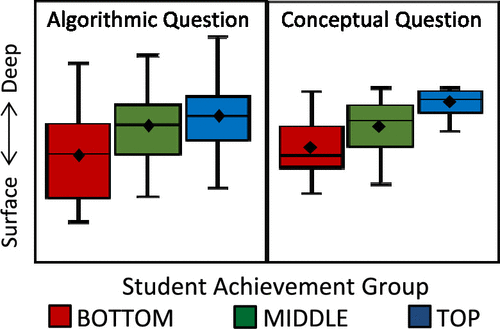当前位置:
X-MOL 学术
›
J. Chem. Educ.
›
论文详情
Our official English website, www.x-mol.net, welcomes your
feedback! (Note: you will need to create a separate account there.)
Problem-Solving Behaviors of Different Achievement Groups on Multiple-Choice Questions in General Chemistry
Journal of Chemical Education ( IF 2.5 ) Pub Date : 2019-11-27 , DOI: 10.1021/acs.jchemed.9b00774 Melonie A. Teichert 1 , Maria J. Schroeder 1 , Shirley Lin 1 , Debra K. Dillner 1 , Regis Komperda 2 , Diane M. Bunce 1, 3
Journal of Chemical Education ( IF 2.5 ) Pub Date : 2019-11-27 , DOI: 10.1021/acs.jchemed.9b00774 Melonie A. Teichert 1 , Maria J. Schroeder 1 , Shirley Lin 1 , Debra K. Dillner 1 , Regis Komperda 2 , Diane M. Bunce 1, 3
Affiliation

|
On the basis of the results of two prior studies at the US Naval Academy (USNA), which described the choice of study resources and the self-reported learning approaches of students of differing achievement levels, the current investigation examines how students of differing achievement levels in general chemistry actually solve multiple-choice questions. A think-aloud protocol was selected as the vehicle for this investigation. This research utilized and compared the correlation of both a holistic qualitative and a quasi-quantitative approach to analyzing the interviews. The holistic qualitative approach identified student behaviors in four broad categories: problem-solving, conceptual understanding, test-taking strategies, and use of scientific language. The quasi-quantitative analysis allowed us to focus on more specific behavioral trends within these categories providing a more detailed picture of what middle-achieving students do when solving algorithmic and conceptual problems. Middle-achieving students demonstrated more variability when solving conceptual questions as compared to algorithmic questions, applying a mixture of behaviors that were characteristic of higher-achieving and lower-achieving students. Implications for teaching based on this research include the need to help middle-achieving students become aware of the difference between their approaches to solving algorithmic versus conceptual questions, emphasizing what they do correctly and how they can improve their problem solving.
中文翻译:

通用化学中多项选择题对不同成就组的问题解决行为
根据美国海军学院(USNA)的两项先前研究的结果,该研究描述了学习资源的选择以及成就水平不同的学生的自我报告的学习方法,当前的调查研究了成就水平不同的学生如何在一般化学领域中,实际上可以解决多项选择题。选择了“思考型”协议作为此调查的工具。这项研究利用并比较了整体定性和准量化方法之间的相关性来分析访谈。整体定性方法将学生的行为分为四大类:解决问题,概念理解,应试策略和科学语言的使用。准定量分析使我们能够专注于这些类别中更具体的行为趋势,从而更详细地了解中等成绩的学生在解决算法和概念问题时的工作方式。与算法问题相比,成绩中等的学生在解决概念性问题时表现出更大的可变性,他们将表现较高和成绩较低的学生的行为混合在一起。根据这项研究对教学的启示包括需要帮助中学生学习解决算法问题和概念性问题的方法之间的差异,强调他们的正确做法以及如何改善解决问题的能力。
更新日期:2019-11-28
中文翻译:

通用化学中多项选择题对不同成就组的问题解决行为
根据美国海军学院(USNA)的两项先前研究的结果,该研究描述了学习资源的选择以及成就水平不同的学生的自我报告的学习方法,当前的调查研究了成就水平不同的学生如何在一般化学领域中,实际上可以解决多项选择题。选择了“思考型”协议作为此调查的工具。这项研究利用并比较了整体定性和准量化方法之间的相关性来分析访谈。整体定性方法将学生的行为分为四大类:解决问题,概念理解,应试策略和科学语言的使用。准定量分析使我们能够专注于这些类别中更具体的行为趋势,从而更详细地了解中等成绩的学生在解决算法和概念问题时的工作方式。与算法问题相比,成绩中等的学生在解决概念性问题时表现出更大的可变性,他们将表现较高和成绩较低的学生的行为混合在一起。根据这项研究对教学的启示包括需要帮助中学生学习解决算法问题和概念性问题的方法之间的差异,强调他们的正确做法以及如何改善解决问题的能力。











































 京公网安备 11010802027423号
京公网安备 11010802027423号